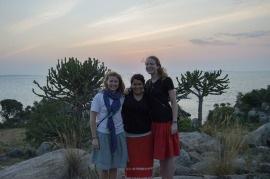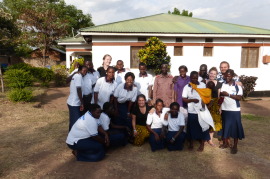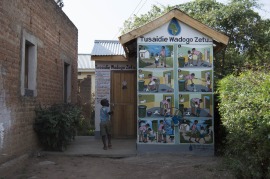When I introduce myself as a dual MBA, Master of Architecture candidate most people are surprised and question the combination as unusual, unique and occasionally contradictory. It should come as no surprise then that my summer internship fell under the category “unconventional”.
Blog post by Grace Goldstein, MBA & Master of Architecture candidate, 2015
President, Entrepreneurship and Venture Capital Association
Washington University (WUSTL) touts itself as an interdisciplinary, cross collaborative university, and while that feels hard to believe on the 3rd day straight in studio working towards final deadline or locked in study rooms during ICE week, my internship epitomized that ideal.
I took a joint architecture – social work class my first year at WUSTL and was introduced not only to the world of social work but also to my partner for the semester, a graduating student in social work focusing in international development. Emily and I ended up with a great project, a look into each other’s worlds and a connection to another part of the university.
We didn’t talk until almost a year later as I was finishing up the first year of my MBA. Emily was now working for Maji Safi Group, a non-profit organization operating in Shirati, Tanzania. Maji Safi needed a designer (read cheap/free) and Emily recalled her semester-long encounter with an architecture student.  It’s hard to pass up any opportunity as an architect to design your own building (ever) especially before graduating from school. I jumped at the chance offering both my design services and applicable skills, like budgeting, from the MBA. Not unselfishly, this “internship” fulfilled every box I wished I could have checked on Weston Career Center forms, but couldn’t – design focus, MBA focus, non-profit/social good, and travel.
It’s hard to pass up any opportunity as an architect to design your own building (ever) especially before graduating from school. I jumped at the chance offering both my design services and applicable skills, like budgeting, from the MBA. Not unselfishly, this “internship” fulfilled every box I wished I could have checked on Weston Career Center forms, but couldn’t – design focus, MBA focus, non-profit/social good, and travel.
I knew very little about Tanzania before I left. The sum total of my knowledge included friends and friends of friends exclaiming, “I know someone who went to Tanzania,” an introduction to the Maji Safi and the information about Shirati, Tanzania posted on their website, and a suggested dress code that included skirts below the knee and shirts with sleeves (a very different wardrobe than the one you would find in my closet).
Tanzania is an east African country bound by the Indian Ocean on the east, Lake Victoria to the northwest and surrounded by Kenya, Mozambique, Malawi and Zambia. Tanzania is home to the Serengeti, Mt. Kilimanjaro, and Zanzibar Island and as a result is as much a tourist destination as an intensely local population.
Fast-forward five weeks, a safari, countless hours in planes and airports, a week with the Swiss Family Robinson exploring Mwanza and acclimating to Tanzania, and the grown up version of sleep away camp in Musoma spending days working and evenings throwing the Frisbee, gathering for family dinners and projecting movies and time to move to Shirati. It’s unfair to boil my first five weeks down to a run-on sentence. It does the experience an injustice; I would need a book or at the least a pamphlet to describe the collage of culture that I was exposed to, woven threads of conversations, people, Swahili bumbles, mundane activities turned epic in their variety, and encounters with animals, food and stories.
I will start the summary story with our 2-hour drive from Musoma to Shirati. Shirati is a village on Lake Victoria in the Mara region, home to 150,000 people. Shirati is also the home base for Maji Safi Group and very dear in the hearts of Max, Bruce and Emily. So, anticipation and excitement to get to Shirati was high and had been anxiously building for weeks. I heard stories about the Mamas and the Community Health Workers, the KMT Hospital and the puppies that were awaiting their parent’s return to the Shirati House. Mama Deborah, who runs the house in Shirati and kept us all fully fed at all hours of the day and Judith, the Mama of the Community Health Workers had been built up to god status in my head before getting to Shirati (the description was more than accurate). If I had a scale for “venturing into the unknown” the meter would have been topping the scale as we drove into Shirati.
I would highly recommend when visiting a village in Tanzania to visit one where the organization you work for and the people you are working with are highly respected in the eyes of the villagers and their employees.  I have never met (descriptors are accurate, not exaggerated) a more welcoming and excited group of people, much less employees. I’d consider myself a pretty friendly person but I couldn’t keep up with the enthusiasm of each of the CHWs. Saying “hello” to someone is a conversation in and of itself in Kiswahli. It is one of the first things I tried to tackle in Tanzania and the last thing I managed to become passable at. There are so many different ways to say hello and each version requires different responses; it felt like an art form and certainly a window into the lost art of conversation, which in the US has been reduced to empty letters sent anonymously over text message.
I have never met (descriptors are accurate, not exaggerated) a more welcoming and excited group of people, much less employees. I’d consider myself a pretty friendly person but I couldn’t keep up with the enthusiasm of each of the CHWs. Saying “hello” to someone is a conversation in and of itself in Kiswahli. It is one of the first things I tried to tackle in Tanzania and the last thing I managed to become passable at. There are so many different ways to say hello and each version requires different responses; it felt like an art form and certainly a window into the lost art of conversation, which in the US has been reduced to empty letters sent anonymously over text message.
 Maji Safi has 16 employees each of whom has been trained in community health practices and has passed tests to qualify them to go out into the village and educate their community about WASH practices. They wear their uniforms with pride, each shirt proclaiming “Niulize kuhusu Maji Safi!” ask me about clean water. Over the course of three weeks in Shirati, this phrase would come to epitomize the spirit and dedication of Maji Safi Group and all the Community Health Workers.
Maji Safi has 16 employees each of whom has been trained in community health practices and has passed tests to qualify them to go out into the village and educate their community about WASH practices. They wear their uniforms with pride, each shirt proclaiming “Niulize kuhusu Maji Safi!” ask me about clean water. Over the course of three weeks in Shirati, this phrase would come to epitomize the spirit and dedication of Maji Safi Group and all the Community Health Workers.
 The original premise for spending the summer in Tanzania was to design the Community Resource Center (CRC). One of the first agenda items in Shirati was to hold a design workshop with the CHWs. The workshop was designed to introduce the premise of the CRC to the health workers and to engage them from the beginning in the discussions and design of the center. After a day of designing we had 4 unique, beautiful designs for the center. However, the true power of the exercise was in the explanation each team gave for their design: the juxtaposition of different spaces, the need for designated rooms and the potential they saw for the growth of the organization in dedicated built forms.
The original premise for spending the summer in Tanzania was to design the Community Resource Center (CRC). One of the first agenda items in Shirati was to hold a design workshop with the CHWs. The workshop was designed to introduce the premise of the CRC to the health workers and to engage them from the beginning in the discussions and design of the center. After a day of designing we had 4 unique, beautiful designs for the center. However, the true power of the exercise was in the explanation each team gave for their design: the juxtaposition of different spaces, the need for designated rooms and the potential they saw for the growth of the organization in dedicated built forms.
The second work driven goal of the trip was to create a budget for Maji Safi. Two weeks later and countless hours spent pacing the porch, drinking glass bottle sodas and calling CHWs to answer reference questions, we had a budget. But like the design workshop and most of our activities in Tanzania the process was arguably as important as the budget itself. I was in a unique position to participate in conversations that were refining and redefining the mission of the organization, the core values and the direction of the individual Maji Safi programs. It’s an unusual experience to sit with a dedicated and driven leadership team and debate the power of a single word in setting the course for an organization’s impact evaluation, growth trajectory and program structure.
I still find it amazing months later, how powerful those three weeks in Shirati were. We spent all of our time together, sleeping, eating, working and playing and the result was that three weeks in Shirati felt more like three months and made leaving a lot harder. I had become much more invested in the future of Maji Safi than I had expected and didn’t want the summer to end and with it my involvement in the organization. The result: I agreed to be the Maji Safi Group Treasurer for the next year and have received approval (officially) to design the Community Resource Center as my Masters Thesis Project. I now have the benefit of designing the CRC with the support and guidance of Maji Safi Group, my thesis advisor, my peers and the resources the Sam Fox School make available. With any luck I’ll be back in Shirati soon, meanwhile the adventure will continue from afar in St. Louis.





 It’s hard to pass up any opportunity as an architect to design your own building (ever) especially before graduating from school. I jumped at the chance offering both my design services and applicable skills, like budgeting, from the MBA. Not unselfishly, this “internship” fulfilled every box I wished I could have checked on Weston Career Center forms, but couldn’t – design focus, MBA focus, non-profit/social good, and travel.
It’s hard to pass up any opportunity as an architect to design your own building (ever) especially before graduating from school. I jumped at the chance offering both my design services and applicable skills, like budgeting, from the MBA. Not unselfishly, this “internship” fulfilled every box I wished I could have checked on Weston Career Center forms, but couldn’t – design focus, MBA focus, non-profit/social good, and travel. I have never met (descriptors are accurate, not exaggerated) a more welcoming and excited group of people, much less employees. I’d consider myself a pretty friendly person but I couldn’t keep up with the enthusiasm of each of the CHWs. Saying “hello” to someone is a conversation in and of itself in Kiswahli. It is one of the first things I tried to tackle in Tanzania and the last thing I managed to become passable at. There are so many different ways to say hello and each version requires different responses; it felt like an art form and certainly a window into the lost art of conversation, which in the US has been reduced to empty letters sent anonymously over text message.
I have never met (descriptors are accurate, not exaggerated) a more welcoming and excited group of people, much less employees. I’d consider myself a pretty friendly person but I couldn’t keep up with the enthusiasm of each of the CHWs. Saying “hello” to someone is a conversation in and of itself in Kiswahli. It is one of the first things I tried to tackle in Tanzania and the last thing I managed to become passable at. There are so many different ways to say hello and each version requires different responses; it felt like an art form and certainly a window into the lost art of conversation, which in the US has been reduced to empty letters sent anonymously over text message. Maji Safi has 16 employees each of whom has been trained in community health practices and has passed tests to qualify them to go out into the village and educate their community about WASH practices. They wear their uniforms with pride, each shirt proclaiming “Niulize kuhusu Maji Safi!” ask me about clean water. Over the course of three weeks in Shirati, this phrase would come to epitomize the spirit and dedication of Maji Safi Group and all the Community Health Workers.
Maji Safi has 16 employees each of whom has been trained in community health practices and has passed tests to qualify them to go out into the village and educate their community about WASH practices. They wear their uniforms with pride, each shirt proclaiming “Niulize kuhusu Maji Safi!” ask me about clean water. Over the course of three weeks in Shirati, this phrase would come to epitomize the spirit and dedication of Maji Safi Group and all the Community Health Workers. The original premise for spending the summer in Tanzania was to design the Community Resource Center (CRC). One of the first agenda items in Shirati was to hold a design workshop with the CHWs. The workshop was designed to introduce the premise of the CRC to the health workers and to engage them from the beginning in the discussions and design of the center. After a day of designing we had 4 unique, beautiful designs for the center. However, the true power of the exercise was in the explanation each team gave for their design: the juxtaposition of different spaces, the need for designated rooms and the potential they saw for the growth of the organization in dedicated built forms.
The original premise for spending the summer in Tanzania was to design the Community Resource Center (CRC). One of the first agenda items in Shirati was to hold a design workshop with the CHWs. The workshop was designed to introduce the premise of the CRC to the health workers and to engage them from the beginning in the discussions and design of the center. After a day of designing we had 4 unique, beautiful designs for the center. However, the true power of the exercise was in the explanation each team gave for their design: the juxtaposition of different spaces, the need for designated rooms and the potential they saw for the growth of the organization in dedicated built forms.


